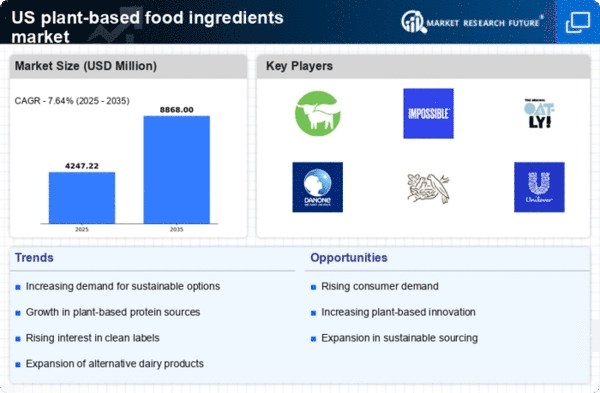Health Consciousness Among Consumers
The growing awareness of health and wellness among consumers is a pivotal driver for the plant based-food-ingredients market. As individuals increasingly seek nutritious alternatives to traditional animal-based products, the demand for plant-based ingredients has surged. Research indicates that nearly 60% of consumers in the US are actively trying to incorporate more plant-based foods into their diets. This shift is largely attributed to the perceived health benefits associated with plant-based diets, such as lower cholesterol levels and reduced risk of chronic diseases. Consequently, food manufacturers are responding by reformulating products to include plant-based ingredients, thereby expanding their offerings in the plant based-food-ingredients market. This trend not only caters to health-conscious consumers but also aligns with the broader movement towards healthier eating habits.
Rising Vegan and Vegetarian Populations
The increasing number of individuals identifying as vegan or vegetarian is a notable driver for the plant based-food-ingredients market. Recent surveys indicate that approximately 8% of the US population identifies as vegan, while around 5% consider themselves vegetarian. This demographic shift is influencing food manufacturers to diversify their product lines to cater to these consumers. As a result, there is a growing availability of plant-based ingredients in various food products, from snacks to main courses. This trend not only reflects changing dietary preferences but also highlights the potential for growth within the plant based-food-ingredients market as more consumers seek out plant-based options.
Regulatory Support for Plant-Based Products
Regulatory frameworks in the US are increasingly supportive of plant-based products, which serves as a significant driver for the plant based-food-ingredients market. Government initiatives aimed at promoting sustainable agriculture and reducing the environmental impact of food production have led to favorable policies for plant-based ingredients. For instance, the USDA has introduced programs that encourage the development of plant-based food systems, which may enhance market growth. Additionally, labeling regulations that allow for clear identification of plant-based products help consumers make informed choices, further driving demand. As these regulations evolve, they are likely to create a more conducive environment for innovation and investment in the plant based-food-ingredients market.
Consumer Preference for Sustainable Sourcing
The increasing consumer preference for sustainably sourced ingredients is a significant driver for the plant based-food-ingredients market. As awareness of environmental issues grows, consumers are more inclined to choose products that align with their values regarding sustainability. Research suggests that over 70% of consumers in the US are willing to pay a premium for sustainably sourced food products. This trend is prompting food manufacturers to prioritize plant-based ingredients that are produced with minimal environmental impact. Consequently, the plant based-food-ingredients market is likely to benefit from this shift, as companies that emphasize sustainable sourcing practices may gain a competitive edge in attracting environmentally conscious consumers.
Technological Advancements in Food Processing
Technological innovations in food processing are playing a crucial role in shaping the plant based-food-ingredients market. Advances in extraction and processing techniques have improved the quality and functionality of plant-based ingredients, making them more appealing to food manufacturers. For instance, new methods for isolating proteins from legumes and grains have enhanced their taste and texture, allowing for better incorporation into a variety of products. This technological progress is likely to drive further investment in the plant based-food-ingredients market, as companies seek to leverage these advancements to create innovative and appealing plant-based offerings. The potential for improved product quality may also attract a broader consumer base.
















